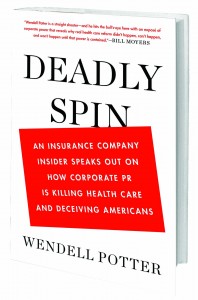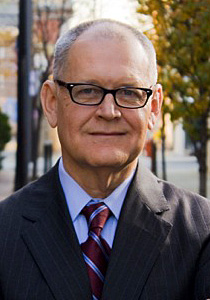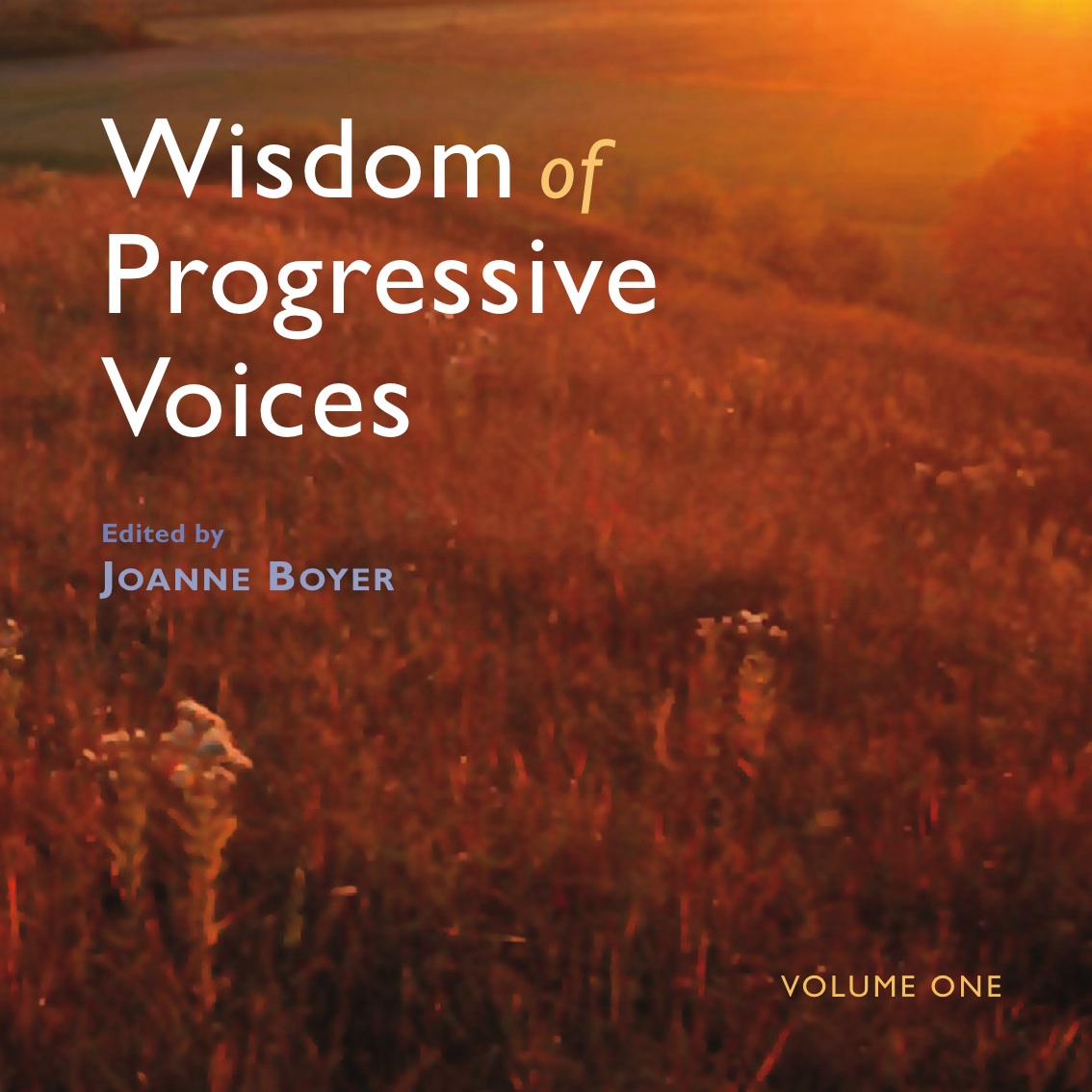Deadly Spin: Attacking the Corporate Strategy To Keep Us Ignorant
Did you ever wonder about why and how the general public stays so ill-informed on what is really in the Affordable Care Act or just how and why we remain the only industrialized nation in the world with a for-profit insurance company?
 Wendell Potter explains it all in his book Deadly Spin. From clandestine meetings carefully organized to leave no paper trail to creating third party front groups, Potter lets the reader in on the dirty secrets most big corporations would rather have the masses be in the dark about because the stakes are high and the profits even higher.
Wendell Potter explains it all in his book Deadly Spin. From clandestine meetings carefully organized to leave no paper trail to creating third party front groups, Potter lets the reader in on the dirty secrets most big corporations would rather have the masses be in the dark about because the stakes are high and the profits even higher.
“I wrote the book because I wanted people to have a better understanding of just how the special interests are able to manipulate public opinion and how the vast majorities of people just don’t have a clue,” said Potter. “And how effective it is to get people to think, act and vote against their own self-interests…and how corporate interests are capable of influencing public policy through public opinion.”
Michael Moore, at one point an adversary of Potter’s, sums up the book best: “You’re the Daniel Ellsberg of corporate America. I mean, what that man did during Vietnam helped to end that war…. People should read this book. The whole book lays it right out there about how the health insurance companies had bamboozled this country and lied, just outright lied about things.”
For information on how to order the book, click here.
There are few people today – in any walk of life – who have the courage and wisdom of Wendell Potter. Potter’s determined passion to help educate the American public and help them understand the “deadly spin” of the for-profit health insurance industry serves as a centering force in a world that appears to be turned upside down no matter where one looks.
Potter, a former public relations executive with CIGNA, reached deep within his soul about five years ago after a life-changing event and became determined his legacy would carry far more than the words “retired health insurance executive.” Few have understood – or participated first hand – in the intentional deceit by the health insurance companies of how the for-profit health care system functions. Potter will be the first to tell you how he helped to malign Michael Moore and his movie Sicko. How things have changed. Today, the two share the podium at conferences discussing the horrifically broken U.S. health care system.
In his book Deadly Spin (see sidebar), Potter provides not just an exposé of health insurers but a stark warning that corporate spin is distorting our democracy. But yet it is more than just his knowledge and “insider’s understanding” of this industry that make Potter such a force in the debate that will continue for years on how to reform a health care system that is rigged to work for corporate interests rather than people.
It is that quiet sense of speaking truth to power; the inner knowledge that he possesses that helping people is what matters in life. No screaming from a pulpit, no finger-pointing in anyone’s face. Rather a calm resolve that comes only from an inner peace that moves one forward through immeasurable odds. He remains a beacon of hope in 21st century America that we may once again “turn our hearts” to something of value – something that is not measured in dollars and cents.
We at Wisdom Voices are honored to have had the opportunity to have talked one-on-one with Wendell Potter on a recent visit to Minneapolis, a week before the Supreme Court ruling on the Affordable Care Act. As our July Progressive Profile, we have decided to let his own words do the talking. And we strongly encourage readers to get a copy of Deadly Spin and make it mandatory reading for anyone who treasures our American heritage.
For more of the facts of who Wendell Potter is, we invite you visit his web site. Our goal is to provide more of the “why” Wendell Potter pursues the tireless and thankless job of trying to make health care work for people and not corporations. In the truest tradition of providing today’s “wisdom voices”, we present Wendell Potter – in his own words.
On why he decided to have a change of heart/soul on what he was called to do with his professional life:
“I think a lot had to do with the fact that I was born to a working class family in the southern Appalachians. I was fortunate enough to get a good education and I wanted to be a journalist. I was trained to be someone who wanted to try to write in ways that revealed truth and provided people with information that would help them understand things better. I think had it not been for that, I probably would not have done what I ultimately did.
“I left my journalism career and got into public relations more than 35 years ago, and I ultimately wound up in the health insurance industry. I had a very successful PR career, but I still had that training as a journalist and I still knew where I came from.
“I went back to visit my family in Tennessee 5 years ago and I read about something called the Health Care Expedition that was being held not too far from where I grew up. I had never heard of anything like this before. There were articles that people would be traveling from hundreds of miles away – from Ohio, South Carolina, Georgia. It was being held at the Wise County (Virginia) Fair Grounds. So I was very curious and decided to go check it out. When I got there I saw something I never expected to see
“I saw people lined up by the thousands at this three-day event trying to get care that was being provided free. That morning, people were soaking wet because it had been raining. They were lined up to get care that was being provided in barns, and then it hit me. I realized that those people could have been my neighbors, people I had grown up with, people I had shared cultural roots with. I realized that what I was doing for a living, in some way, was making it necessary for those people to have to resort to those lengths in order to receive care.
“I made a commitment that day that I would figure out some other way to make a living and ultimately did. That was an eye opener for me. Had I not been from that region, had I not gone back home at that time, had I not been curious enough to check it (the health exposition) out. There were many things that impacted me. It was a reminder as I began to think more of my life. I realized that what I was doing was in many ways the opposite of what I was trying to do in my first career (journalism). Then, I was trying to educate and enlighten and inform people. Now, more often than not, I was trying to obscure and misdirect the truth. I became so utterly ashamed of what I had become that I ultimately walked away from that job a few months later.”
On why others within the industry chose not to follow Potter’s path:
“We get stuck. We have tuition payments, car payments, and house payments. We have a lifestyle we’ve grown accustomed to. Our egos (and sense of who we are) are wrapped up in what we do. It’s hard to walk away from that. People think it’s impossible to walk away from that. I realized that it was not.
“It’s been a blessing. I don’t make near as much money, but I can’t think of any measure in which this has not been a blessing. I’ve met some of the most wonderful people since I’ve been away from that industry and have had experiences I would never have had. I’ve been stretched in ways I couldn’t imagine. I was never one who wanted to speak in front of an audience or to go in front of a camera. But I’ve overcome that. It was necessary if I was going to be doing what I was going to be doing. I had to walk through my fears.
“I keep a gratitude journal and that is so helpful for me to have reminders of just how much joy I have in my life. That keeps me centered. I’m just so grateful to be doing what I’m doing. As I was contemplating making this decision, I was thinking about my own legacy – what I would want my legacy to be when I’m no longer on this earth. I realized that I sure didn’t want it to be ‘a retired insurance company executive’.
On the Supreme Court:
“Ultimately, there are certain things beyond my control. I can’t control what the Supreme Court is going to do. I have to look at that with detachment. I can’t control that. That’s just the reality I have to accept. And we have to work with reality. Once we know what the Supreme Court is going to do, then we can develop a strategy of how to go forward.

Wendell Potter: I knew that I had some things that I thought I could and should do, that if I didn’t do, I would regret on my death bed.”
“It will be a decision and we will have to figure out what happens next. What I do think and hope is that advocates for single payer and universal coverage and advocates for meaningful health care reform will start to think more strategically and cohesively. I’ve observed that a lot of advocates don’t see eye-to-eye on how things should be, which result in tensions and resentments; and that’s not healthy, it’s counterproductive.
“What I would like to do is hopefully become someone who can help build bridges in the advocacy world. To get people to see that we share common goals; we may see the paths as being different on how to get to the ultimate ideal/objective, but if we don’t start working together.
On what keeps him hopeful:
“You have to look at this fight and know that we’re in for the long haul and we can’t expect instant gratification. We have to know that it takes time for significant change particularly when you’re fighting entrenched special interests. It took a long time to get the Civil Rights Act passed, to get Medicare passed. But, on the other hand, we’re seeing things today that may be able to be changed more rapidly than they have been in the past. That doesn’t mean that it’s going to be an easy slog to get to universal coverage, because it’s not. It’s going to take time. But it’s a possibility and unless we keep the faith, keep going despite discouragement, then the other side wins.”
On Deadly Spin (See Sidebar):
“I call it ‘invisible persuasion’ and I’m hoping the book sheds some light on this and makes it more visible to people so they know how it’s done and how corporate spin has shaped the health care debate.
“In the book, I try to give people tools how to be wise to manipulation and what to look out for. People should know that most of the advertising being done (to discourage health care reform) and the organizations that are sponsoring them are in many cases just front groups for the insurance industry. It’s been estimated that $250M has been spent trying to discredit the health care law. When you get that kind of spending, it’s no wonder people don’t know what’s in the law. This is done purposely. In this book, I try to explain why that happens and where that money comes from and how all of us are susceptible to this type of persuasion.”
On his advice to the public:
“Be skeptical about what you hear. Know that almost everyone you hear expressing a point of view has an agenda. Don’t outsource your thinking to TV commentators. Take the time to try and educate yourself.
“If you don’t know what’s in the Affordable Care Act, try to educate yourself. There are more reliable places to get information. For example, Consumer Reports provides factual information on the ACA. One of the key ways why the special interests are so successful is they know we outsource our thinking – we are so willing to let others think for us…and we’re so gullible.
“We all lead busy lives, but educating yourself is important. Think beyond yourself. Think about your children and the kind of world we’re creating for them. It’s important to spend a little time to get informed before you pull a voting lever.”


